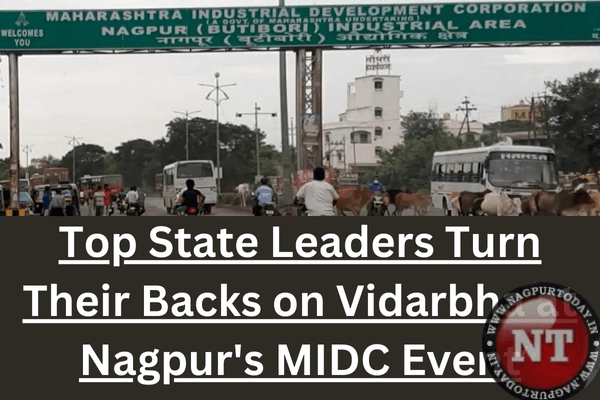 Nagpur:The recent Maharashtra Industrial Development Corporation (MIDC) mega event in Nagpur was meant to signal a new era for industrial development in the long-neglected Vidarbha region. Promoted with the allure of star-studded attendance, including Chief Minister Eknath Shinde, Union Minister Nitin Gadkari, and Deputy CMs Devendra Fadnavis and Ajit Pawar, the event raised expectations among local entrepreneurs and potential investors. However, what unfolded was a stark reminder of the apathy that has characterized the region’s leadership.
Nagpur:The recent Maharashtra Industrial Development Corporation (MIDC) mega event in Nagpur was meant to signal a new era for industrial development in the long-neglected Vidarbha region. Promoted with the allure of star-studded attendance, including Chief Minister Eknath Shinde, Union Minister Nitin Gadkari, and Deputy CMs Devendra Fadnavis and Ajit Pawar, the event raised expectations among local entrepreneurs and potential investors. However, what unfolded was a stark reminder of the apathy that has characterized the region’s leadership.
On the day of the event, only Industries Minister Uday Samant graced the occasion, leaving attendees and business leaders feeling deceived and marginalized. Pradeep Maheshwari, a strategist in natural resources, articulated the disappointment, emphasizing that such a lack of attendance sends a “negative message” to the business community. “This is like rubbing salt on the wounds of Vidarbha entrepreneurs,” he lamented.
The absence of key leaders was particularly disheartening given the context. The event, which could have served as a platform for announcing significant initiatives to stimulate industrial growth in Vidarbha, ended up as a lackluster gathering. One industrialist pointed out the absence of announcements typically associated with high-profile attendees, noting that such leaders are crucial for signaling serious commitments to investment and policy direction.
The rationale for the leaders’ no-shows remains murky. Unlike situations where emergencies dictate a withdrawal, this event faced no such calamity. If these leaders had previously committed their presence, the sudden change raises questions about their prioritization of Vidarbha’s industrial aspirations.
The implications of this oversight are profound. The lack of representation from top state leaders diminishes confidence among local and potential investors, reinforcing the narrative of neglect that has long plagued Vidarbha. One businessman connected with the metal industry articulated the importance of leadership presence at such events, stating, “Big announcements come from big people.” The absence of these figures not only dampens enthusiasm but also undermines the perception of Vidarbha as a viable investment destination.
This pattern of non-committal leadership is emblematic of a broader trend that has left Vidarbha in the shadows of Maharashtra’s economic development. Despite its rich natural resources and potential for growth, the region continues to face systemic neglect, and events like these only serve to highlight the disconnect between political promises and actual engagement.
As Vidarbha entrepreneurs grapple with the fallout from this event, it raises a critical question: How serious are Maharashtra’s leaders about fostering industrial growth in a region that desperately needs it? The failure to deliver on commitments, both in attendance and substance, reflects a troubling disregard for the very fabric of local entrepreneurship and the potential it holds for the state’s future. Until there is a genuine investment of time and resources from top leadership, Vidarbha’s industrial dreams may remain just that—dreams.














